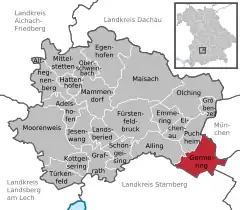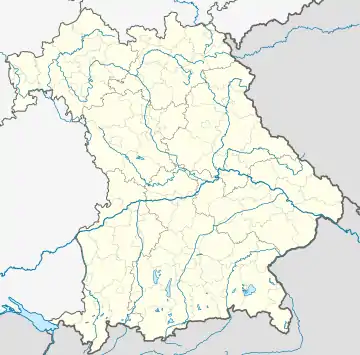Germering | |
|---|---|
 Town hall | |
 Coat of arms | |
Location of Germering within Fürstenfeldbruck district  | |
 Germering  Germering | |
| Coordinates: 48°08′N 11°22′E / 48.133°N 11.367°E | |
| Country | Germany |
| State | Bavaria |
| Admin. region | Oberbayern |
| District | Fürstenfeldbruck |
| Government | |
| • Lord mayor (2020–26) | Andreas Haas[1] (CSU) |
| Area | |
| • Total | 21.61 km2 (8.34 sq mi) |
| Elevation | 535 m (1,755 ft) |
| Population (2022-12-31)[2] | |
| • Total | 41,355 |
| • Density | 1,900/km2 (5,000/sq mi) |
| Time zone | UTC+01:00 (CET) |
| • Summer (DST) | UTC+02:00 (CEST) |
| Postal codes | 82101–82110 |
| Dialling codes | 089 |
| Vehicle registration | FFB |
| Website | www.germering.de |
Germering (Central Bavarian: Geamaring) is a town of approximately 40,500 within the district of Fürstenfeldbruck, in Bavaria, Germany. It is directly adjacent to the city of Munich and borders it to the west.
History
The area of Germering has an old history attested by findings of burial mounds of the New Stone Age and the Bronze Age, as well as a "villa rustica" (as in nearby Leutstetten) built by the Romans. There was a trade route through the city with numerous brick kilns. After their discovery a glass roof was erected over one (near the Nebelerstrasse) so one can still view it.
Germering was first reliably mentioned about 859-864 A.D. In those days it was still known as Kermeringon, but apparently it was formerly mentioned under the name Germana vel admonte. Unterpfaffenhofen, the south-west part of Germering, was first named in a charter dated 1190, but both villages remained small and rural until they experienced several significant increases in population during the 20th century.
During World War II, a subcamp of the Dachau concentration camp was located in the town.[3]
In 1978, the two independent towns Unterpfaffenhofen and Germering were merged to form present-day Germering. The new city coat of arms was created in 1981 by Karl Haas, who incorporated the coats of arms of both former boroughs.
 Germering St Martin church
Germering St Martin church Germering-Streiflach former grange
Germering-Streiflach former grange Germering lake
Germering lake
Honorary citizens
- Claudia Hengst (born 1969), well-known disabled sportswoman and multiple gold medal winner at the Paralympics, world and European champion, honorary citizen since 2001
- Robert Huber (born 1937), residing in Germering, received the Nobel Prize for Chemistry in 1988 and was appointed honorary citizen in the same year
Notable people
- Peter Brugger (born 1972), singer and guitarist, member of the Sportfreunde Stiller
- Lena Dürr, alpine skier, grew up in Germering[4]
- Thomas Huber (born 1963), actor (including Lindenstrasse and The Great Bellheim)
- Carl Spitzweg (1808–1885), Biedermeier-era artist, born in the town-district Unterpfaffenhofen
Personalities who have worked on the ground
- Gus Backus (1937–2019) American singer, lived in Germering until his death
- Heinz Braun (1938–1986), painter, lived in Germering
- John Christopher Howland (1928–2013), singer, actor and entertainer, lived in Germering (Harthaus)
- Siegfried Lowitz (1914–1999), actor, lived in Germering
- Harry Thumann (1952-2001), synthesizer composer, founded his Country Lane Studios in Germering in 1973, and owned it until 1983.
- Erhard Wunderlich (1956–2012), handball player, silver medal winner at the Summer olympics 1984, lived in Germering
References
- ↑ Liste der ersten Bürgermeister/Oberbürgermeister in kreisangehörigen Gemeinden, Bayerisches Landesamt für Statistik, 15 July 2021.
- ↑ Genesis Online-Datenbank des Bayerischen Landesamtes für Statistik Tabelle 12411-003r Fortschreibung des Bevölkerungsstandes: Gemeinden, Stichtag (Einwohnerzahlen auf Grundlage des Zensus 2011)
- ↑ "Linde, Land Nordrhein-Westfalen, Germany - Pages - glosk". Archived from the original on 2009-02-09. Retrieved 2008-11-01.
- ↑ Janz, Thomas (3 February 2012). "Dürr: "I'm Not Going To Stress Myself Out!"". Fischer Sports. Retrieved 28 December 2013.
External links
![]() Media related to Germering at Wikimedia Commons
Media related to Germering at Wikimedia Commons